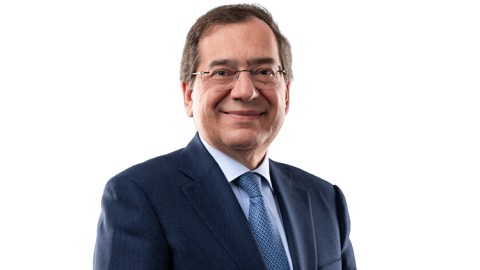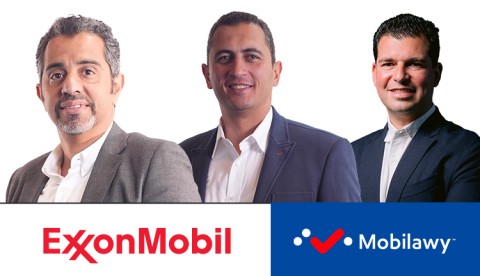Egypt Oil & Gas CEO and Founder Mohamed Fouad meets with one of the energy sector’s leading women Iman Hill, CEO of the International Association of Oil & Gas Producers (IOGP), to get a deeper insight into where the industry is heading and what hot opportunities are in store for Egypt.
How does it feel to be back in Egypt?
It feels absolutely lovely always when the plane is coming down and I can see the lights of Cairo, and it just makes my heart happy, because I am coming home.
How would you characterize the last decade and how do you see our industry in the coming decade?
I’ve worked all over the world and one thing I can say about Egypt is that the government of the country always honored the sanctity of the contract and never repatriated or repossessed assets. I think that’s something that is huge in terms of providing stability and actually real partnership with partners coming in to invest.
I think there have been some very clear big things for Egypt in the last decade. Usually, our sector in the past has been dominated by international oil companies and today I would say you see many more national players, local companies, which is great because you know it is pride of ownership there and it creates lots of job opportunities. The other thing I’d say that was huge in the last decade, it was very visionary from His Excellency Minister of Petroleum and Mineral Resources Tarek El Molla, is the establishment of the East Mediterranean Gas Forum because the challenges that we face as an industry, as a world, is all about how we can actually come together to overcome those challenges and create the platforms for breaking down those national barriers and doing a kind of regional trade and so on. So, those I would say were the big things in the last ten years.
Looking forward, there is no doubt that Egypt established itself as a regional hub. I think it is well on its way to actually gaining a reputation as an international hub. I think the unfortunate events of last year, the Ukraine invasion, also creates opportunities here locally because this is an LNG exporting country, and so there is even more opportunity to actually grow that. If you think about this coming decade and what we are facing we expect to with respect to all of us working together to reach the Paris Climate Agreement goals.
Then the fact that Egypt signed the Global Methane Pledge last year is huge. The fact that there is already a decarbonization plan that is overseen by His Excellency and the ministry and that was published recently. Those are really big things, and it is time to be in concrete action on methane emissions, on implementing the decarbonization solutions in existing and new projects.
I think finally that without people we are not going anywhere. The middle management development program that was started by His Excellency, that was visionary; it’s huge to make sure that capacity, capability, the talent pipeline is standing this country in good stead. So, those are some of the things I think about with respect to the next decade.
Given what you’ve just mentioned regarding the next decade, what are the greatest opportunities do you think Egypt has for its energy sector?
This country is a gas switch. We all want to go towards and have to go towards climate-neutral energy supply sources, but there isn’t enough renewables at the moment to meet demand. So, gas is the transition fuel that can allow basically the development of eventually a renewable hydrogen economy, a sustainable renewable-hydrogen economy. So, for Egypt, I think this is huge. And then the leadership that Egypt shows in the region, but also to other Global South neighbors, you know the African nations, because the energy transition is not the same for everybody. So, I think those are specific opportunities.
What are your views on the role that green hydrogen can play and how do you think Egypt is placed to contribute?
I think it is important to recognize that until there is sufficient green hydrogen or renewable hydrogen, it would be great to acknowledge that low-carbon hydrogen, which is produced with a combination of gas and carbon capture and storage (CCS), has to be the interim step. It is a chicken and egg situation in a way because if there is no infrastructure for renewable hydrogen, we won’t be able to produce renewable hydrogen. If there is not enough renewable hydrogen, we will not build the infrastructure. And our industry knows how to build gas plants for low-carbon hydrogen, and then we can integrate in a very streamlined way renewable hydrogen into those. The fact that Egypt has actually gone forward and signed memorandums of understanding (MoUs) is taking that first step to enable a more sustainable, cleaner hydrogen economy.
Taking you from another angle as a leading woman in the energy sector, can you share your thoughts on career prospects for women in this sector in the context of the energy transition?
I remember last year at EGYPS, I was listening to many colleagues who were talking about what their companies were doing today around inclusivity, driving diversity, and creating opportunities for women. I think it is a fantastic time for women to be in our industry. It is an exciting industry and I think if I think about the energy transition, it’s such a broad range of skills that are required. Your technical people have to do their stuff on the technology, the commercial people have to set up the frameworks, we need our comms [communications] people to be advocating. So, what I would say is that there are opportunities for all and all are welcome. I struggle to think of a more exciting industry to be in.
What are the key takeaways from your experience working around the world and what lessons can we learn from this?
There are two or three things that stand out for me from the different corners of the world. Let’s take it in about energy transition, for example. There’s no cookie-cutter approach to the energy transition. There’s no one size fits all. I am really pleased to see that there is now a growing recognition about what can be done in the Global North doesn’t have to be applied in the Global South.
I was really pleased to see also this growing ownership from the Global South around. You know, we’re going to develop our resources and we’re going to do that to derive the economic development of all nations, and actually by the way, we’ve got sunshine and we’ve got wind and so we can in a way accelerate our ability to generate energy from clean sources. I really like that there’s a growing kind of recognition that what happens in Europe doesn’t necessarily apply to the rest of the world.
The other thing I’ve noticed is that it’s those countries and regions where the government, the regulators and the industry actually come together to have the constructive dialogue around what’s needed to continue to grow the sector and develop the sector and meet the challenges that we’ve got as a society. That’s where things really work well and you see that actually, this happened in Egypt a long time ago. But you see it in places like Guyana and Suriname today, we’re rapidly trying to develop their oil and gas sector, and actually it’s forcing those partnerships and those can only be positive.
My final [point] again comes back to people which is how do we continue attracting people into our industry here in Egypt is not another problem. But Gen Z and millennials in Europe don’t want anything to do with our industry. So how do we continue to actually make ourselves attractive and describe what we do and the critical role that we play for society properly so we can keep filling the talent pipeline?
What piece of advice would you give to the young women in the energy sector’s workforce that could help them advance their careers?
I would say two or three things again. It would be, first of all, nobody could stop you from achieving your dreams except you. The second thing is look out for and reach out to those other women local to you who understand the challenges of the sector as a whole, but also really understand the local challenges because they will always want to help. The final thing I would say is that our generation created the space and reputation for the generations that came after us. These generations today are creating the space, the environment, and the reputation for their daughters and for granddaughters, so I would always say be dependable. When you say “I’m going to do something”, do it with quality.








